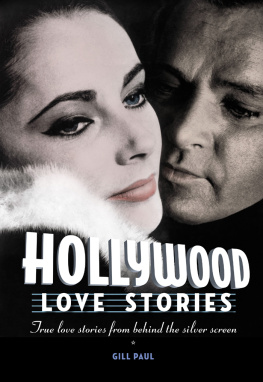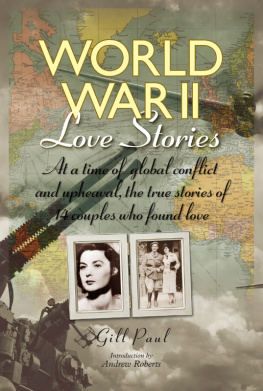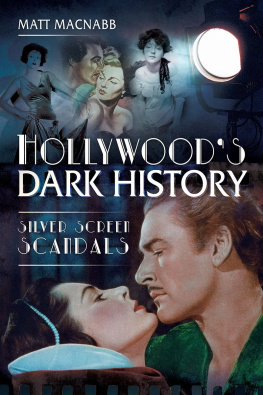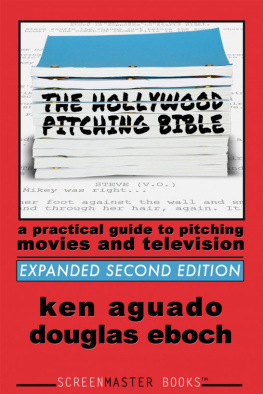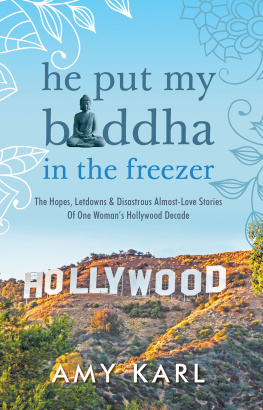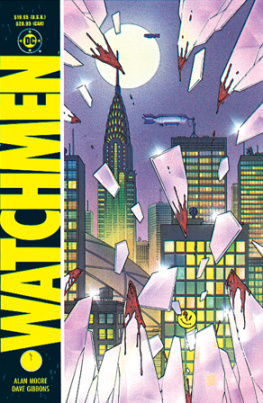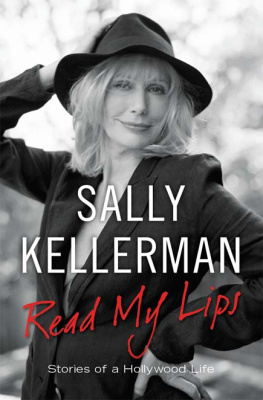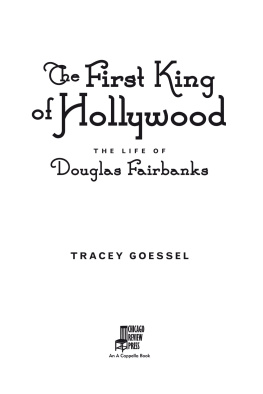HOLLYWOOD
LOVE STORIES
True love stories from the golden days of the silver screen
GILL PAUL

Lights, camera, actionand love.
Hollywood is host to some of the greatest love stories of all time, both on- and off-screen. From the poignant lifelong affair between Spencer Tracy and Katharine Hepburn, to the scandalous liaison between Ingrid Bergman and Roberto Rossellini, and the surprising romance between Arthur Miller and Marilyn Monroe, the love affairs of Hollywoods kings and queens have long graced our screens and filled our newspapers.
In Hollywood Love Stories, 14 real-life love affairs are retold in dramatic detail, offering a glimpse into the glittering, and racy, lives of the stars between the 1920s and 1970s.
Gill Paul is an author of historical fiction and non-fiction, whose books include the popular World War I Love Stories and World War II Love Stories (both 2014). Among her other published works are Women and Children First (2012) and The Affair (2013), which takes place in Rome in 1962 as Elizabeth Taylor and Richard Burton fall in love on the set of Cleopatra.
For Marion, Christina and Ruby: three generations of superstars.
First published in the UK in 2014 by
Ivy Press
210 High Street
Lewes
East Sussex BN7 2NS
United Kingdom
www.ivypress.co.uk
Copyright Ivy Press Limited 2014
All rights reserved. No part of this book may be reproduced or transmitted in any form or by any means, electronic, or mechanical, including photocopying, recording, or by any information storage-and-retrieval system, without written permission from the copyright holder.
British Library Cataloguing-in-Publication Data A catalogue record for this book is available from the British Library
Print ISBN: 978-1-78240-145-2
EPUB ISBN: 978-1-78240-194-0
MOBI ISBN: 978-1-78240-195-7
This book was conceived, designed and produced by
Ivy Press
Creative Director Peter Bridgewater
Publisher Susan Kelly
Art Director Wayne Blades
Senior Editor Jayne Ansell
Designer Andrew Milne
Picture Researcher Katie Greenwood
Colour origination by Ivy Press Reprographics
Distributed worldwide (except North America) by Thames & Hudson Ltd., 181A High Holborn, London WC1V 7QX, United Kingdom
CONTENTS
Hollywoods first supercouple, Doug and Mary were so popular that their 1920 honeymoon caused riots in Paris and London as fans struggled to catch a glimpse of them.
Natacha was nicknamed The Icicle, but her frosty exterior melted when she got close to the emotional Rudolph, who was homesick in Hollywood, far from his Italian roots.
Greta drove John crazy with her self-sufficiency and unpredictability, but their relationship was perhaps the closest she ever came to marrying.
Clark was Hollywoods most renowned womanizer and Carole was the smart-talking practical joker who tamed himfor a while, at least.
It seems incredible that Katharine and Spencer managed to keep their 26-year affair from his wifeand that the strident Katharine meekly accepted the mistress role.
Vivien and Larry were the golden couple of English theater who took America by storm in the late 1930sbut for their marriage, it was all downhill from there.
Fellini was the great genius of Italian cinema with Giulietta his devoted wife and muse, but behind closed doors the relationship was not all that it seemed.
The epitome of cool despite the age difference between them, Betty and Bogie were the first couple of Hollywood film noir.
Roberto was knocked out by Ingrids smile, which he said lit up Southern California but the American public was appalled by their affair.
Both Frank and Ava were hard-living sex addicts and when they got together, a friend said it was like bringing a lighted match to TNT.
It was love at first sight, the great love of both Yves and Simones lives, marred only by a brief indiscretion with Hollywoods most famous sex goddess.
Egghead weds Hourglass read the newspaper headlinesno one expected the marriage of Marilyn and Arthur to last, but neither did anyone predict how catastrophically it would end.
The Vatican accused her of erotic vagrancy and the House of Congress tried to prevent her return to the States, but Richard and Elizabeths passion was explosive and utterly unstoppable.
Steve was Hollywoods favorite bad boy in the 1970s and Ali was the star of the most popular tear-jerker, but their personal love story was destined to be tempestuous.
INTRODUCTION

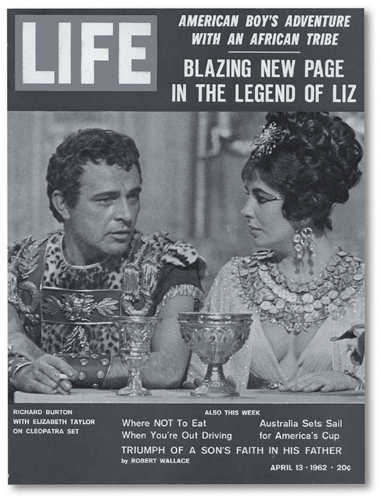

H ollywood marriages are notoriously precarious and always have been. Gossip columns and newspaper headlines trumpet the beginnings of affairs, quote the happy couple as they declare undying love, print the radiant wedding photographs, and then start counting down the days till it all falls apart. Mickey Rooney, Lana Turner, and Elizabeth Taylor each married eight times, and the average movie star of the Golden Age of Hollywood (usually dated from the first talkie in 1927 through to around 194849) has been married around three or four times. Why should the divorce rate be so high when actors are human beings who need love as much as the rest of usperhaps even more so?
THE EARLY YEARS
The movie industry was born on December 28, 1895, when thirty-five audience members sat in Pariss Grand Caf to watch a short film by the Lumire Brothers. The medium was a novelty hit but it wasnt enticing to theater actors, who considered it beneath their dignity to appear on celluloid. Actors who couldnt find other work consented to be in early films but didnt want their names in the credits. However, the public soon became fascinated by the performers and gave them nicknames: Florence Lawrence was The Biograph Girl because she worked for Biograph Studios; Mary Pickford was Little Mary after the child she played on-screen; and Max Aronson was Bronco Billy in a series of films about that character.

Florence Lawrence, The Biograph Girl. Her fame was assured after a publicity stunt in which the studio spread a rumor she had died in an automobile accident, then took out a full-page newspaper ad announcing that she was still alive and had a new movie coming out.
In 1911, Photoplay magazine and Motion Picture Story were founded to give readers the inside scoop on new films in production, and in 1914 Louella Parsons wrote her first gossip column. They understood what the movie bosses were trying to denythat the public had a hunger for information about the private lives of these beautiful people. It also became apparent that the fans would be faithful to their favorites and would pay to see all their films, providing a ready-made audience. So far, so good, but the bosses were nervous about giving actors pumped-up ideas of their own worth. They didnt want popular actors being able to demand higher salaries, which could undermine the films profit margins. Accordingly, they tied them to contracts that provided a weekly salary for a period of, several years. The studio could pull the plug if box-office receipts for a particular star were not up to expectations, but the actors were stuck with the studio till the end of the term.
Next page
